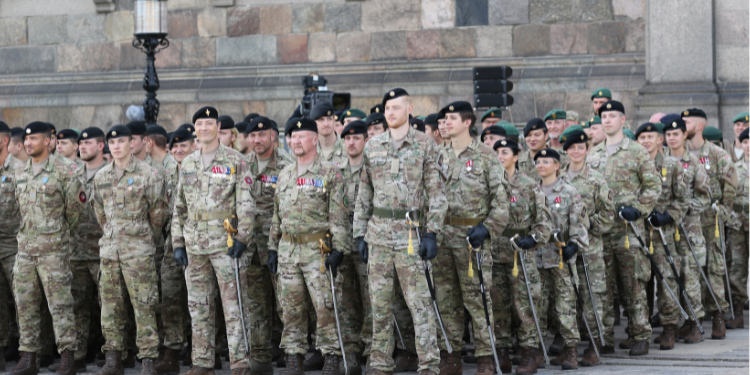News from CS
Denmark plans to invest further in the military and conscript women for military service
The Danish Prime Minister, Defense Minister and Foreign Minister has recently presented the Danish governments plans for further military investments.
Among further investments in the military, including building up a heavy brigade with up to 6ooo soldiers and more equipment and material, the government is proposing a more robust conscription from 2026 including both men and women. The serving period will also be extended from four to 11 months. Women in Denmark can already volunteer for military service. In 2023, they made up about a quarter of the cohort.
CS chairman Jesper Korsgaard Hansen has a positive outlook on the terms of conscription as well as the further investments in the defense. Now it’s about speeding up the persistent measures, so the defense can become ready for future tasks.
– It has been proposed to take in more conscripts and extend the serving period. If the politicians decide to do so, it requires more equipment and materials as well as renovation of buildings and living spaces. But it also requires more permanent personnel ready for the task of receiving and educating them.
– This means that military personnel must have the necessary equipment and the necessary time to educate themselves for their core tasks. And something drastic must be done about the big retention issues that the military faces.
He urges the Danish politicians to take further measures in use to ensure a better retention of soldiers.
– Our politicians must ensure measures that can make a significant difference for the personnel. CS has proposed a civilian education scheme as well as a raise in salaries and benefits. If you don’t put in the work to maintain, it’s going to be very difficult to meet the governments goals.
Agreement between employees in the State agreed for the next two years
In Denmark, there is a tradition of negotiating agreements between employers and employees, the latter represented by the trade union they belong to. An agreement is a contract concerning working conditions, which also includes salary terms. An agreement consists of rules and regulations that must be adhered to by both employees and employers. Negotiations can take place in both the public and private sectors, and within the public sector (here, the State), this includes, among others, the police, prison services, and the military.
This spring, the organizations were therefore fully engaged in negotiations for the next two years, and in early February, representatives for the state sector, i.e., all employees in the State, reached a settlement ensuring a salary increase for state employees, as well as other points, which we will delve into further.
Among the top negotiators from the organizations was also the chairman of CS, Jesper Korsgaard Hansen, in his capacity as chairman of the central organization of 2010 – CO10 – a central negotiation and umbrella organization for a large number of professional organizations with a total of approx. 40,000 members – all employed within or retired from positions within the state. Which in addition to CS (employees in the military), also includes professional organizations such as the Police Association, the Customs and Tax Association, the Danish Nurses’ Organization, the Traffic Association, and the Danish Association of Social Workers.
Together with other top negotiators from the largest trade unions in the State sector, and the employers represented by the Minister of Finance and his officials, they met at the Ministry of Finance to reach an agreement that all parties could endorse.
This year, these negotiations lasted for seven days. Then, an agreement was reached, which includes, among other things, raising the basic salary.
A total financial framework of 8.8 % was agreed upon for the entire agreement period, following the Ministry of Finance’s estimate for private wage development in 2024 and 2025.
7.4 % goes to general salary increases for all state employees. The salary increases are expected to result in a 2.50 % improvement in real wages.
In practice, this means that all employees in the state will already receive a real wage increase of 5.89 % as of April 1 this year, with the remaining percentage for next year.
CS Chairman Jesper Korsgaard Hansen was pleased on behalf of his members after the lengthy negotiations.
“I am satisfied with what has been negotiated. The financial framework was the biggest hurdle at the negotiating table. It is no secret that we would have liked it to be even higher to compensate for the wage lag in recent years. But a compromise has been found that will equalize the wage lag by the end of 2025,” he said.
In addition to the agreement on salary and pensions, several other important areas were agreed upon. For example, better conditions for employee representatives.
Effective April 1, 2024, it was agreed that employee representatives should have the opportunity to meet with newly hired employees during working hours.
Furthermore, in workplaces located in geographically dispersed locations or where the number of employees in an employee group exceeds 100, it was agreed that there is an obligation to negotiate the employee representative structure, including the number of employee representatives per employee group, if either party requests it. This change will take effect on April 1, 2025.
Local negotiations:
In addition to the common OK24 agreement between the state and the trade unions, there is also a local agreement between the trade union and the “local” employer. In the case of CS (Civil Servants), it is the Defense, represented by the Personnel Agency under the Ministry of Defense.
The local negotiations took place in the weeks immediately following the conclusion of the national OK, and in CS’s case, the negotiators, in addition to the chairman, were also a team consisting of two specialist consultants and a chief consultant.
They reached an agreement, which included -among other things, the following:
In addition to the general salary increases in the state’s agreement, it has been possible to secure an increase in the base salary for all military groups in CS’ area by 0.5 percent. This is effective as of April 1, 2025.
An economic supplement for soldiers in special operations units after completing their training (e.g., Frogman Corps/Ranger Corps).
A renewed and improved agreement regarding supplements for skilled employees. For example, weapons mechanics, chefs/pastry chefs, etc.
Pension of salary during deployment to service in the Reserve.
As of April 1, 2025, an increase in the base salary for all civilian employee groups has been agreed upon by 0.7 percent.
Detailed information about OK24 are to see on the CS website.


